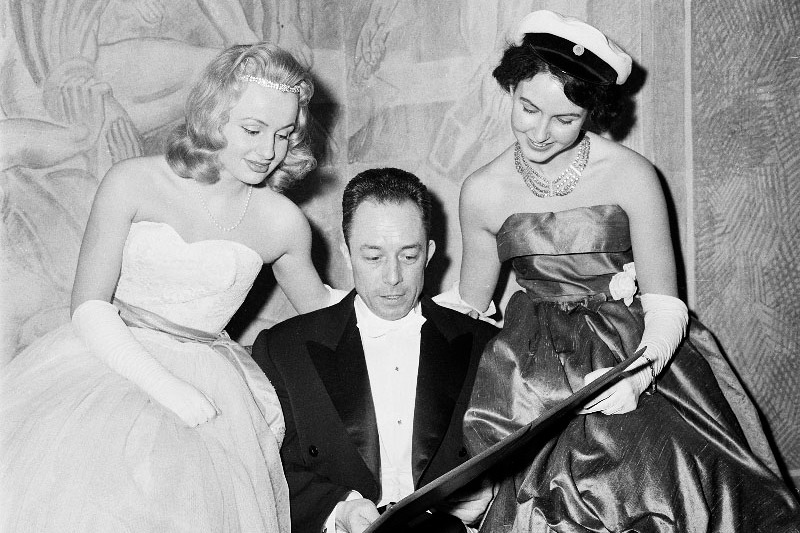

Albert Camus talks with two young women at the Nobel ceremony. (Photo: Jan Ehnemark via Wikimedia Commons, Public domain)
In 1924, two decades before the publication of The Stranger, author Albert Camus was a boy growing up in poverty in Algeria. Noticing his potential, a teacher named Louis Germain took him under his wing, even giving him free lessons to help him secure a scholarship. That’s why, when Camus won the Nobel Prize for Literature in 1957, Germain was one of the people who came to his mind. The author then sent him a moving letter, which continues to resonate with teachers and pupils today.
The letter is dated November 19, 1957, almost a month after Camus was announced as the winner. “I let the commotion around me these days subside a bit before speaking to you from the bottom of my heart,” the author writes. “I have just been given far too great an honor, one I neither sought nor solicited.” Still, Camus saw it as an opportunity to thank Germain for his efforts. “Without you, without the affectionate hand you extended to the small poor child that I was, without your teaching and example, none of all this would have happened.”
At 44, Camus was—and remains—the second-youngest person ever to win this award, only after Rudyard Kipling, who was 41 when he won in 1907. The Swedish Academy recognized the author and philosopher “for his important literary production, which with clear-sighted earnestness illuminates the problems of the human conscience in our times.” Despite his status, the writer never forgot where he came from, nor who got him there. Had it not been for him and the scholarship, Camus likely would have had to join the workforce to support his family.
Germain excitedly replied to Camus’s letter, touched by the author’s gesture. The teacher said that, despite his success, the author would always be his “little Camus.” “It gives me very great satisfaction to see that your fame has not gone to your head,” Germain added. “You have remained Camus: bravo. I have followed with interest the many vicissitudes of the play you adapted and also staged: The Possessed. I love you too much not to wish you the greatest success: it is what you deserve.”
Many whose careers and lives have been shaped by a devoted teacher relate to this exchange. Among them is Ian Wright, a British former soccer player and media personality. In 2024, Wright read Camus’ letter aloud at London’s prestigious Royal Albert Hall as part of Letters Live, a project that brings powerful correspondence to life—a moment that was poignant due to the ex-athlete’s life story.
Much like Camus, Wright had his life shaped by PE teacher Sydney Pigden, who taught him how to read and write, as well as initiating him as a soccer player. Given he had an absent father and an abusive stepfather, Wright has described Pigden as “the first positive male figure” he ever had. After not seeing each other for decades, they had a tearful reunion in 2005, where Pigden told Wright, “I’m so glad you’ve done so well with yourself.” It was a scene that Camus and Germain surely would have found moving.
You can hear Wright’s rendition of Camus’s gratitude letter in the video below.
After winning the Nobel Prize for Literature in 1957, Albert Camus sent a letter of gratitude to his teacher, Louis Germain.
“Without you, without the affectionate hand you extended to the small poor child that I was, without your teaching and example, none of all this would have happened,” he wrote.
Hear Camus’s letter in the voice of Ian Wright, a British former soccer player and media personality.
Much like Camus, Wright had his life shaped by PE teacher Sydney Pigden, who taught him how to read and write. Watch their tearful reunion below:
Sources: Ian Wright reads Albert Camus’ letter to the teacher that changed his life; I embrace you with all my heart; Ian Wright gets a big shock!; Ian Wright: Ex-England striker on troubled childhood and becoming a pro
Related Articles:
Prominent Civil Rights Figure Ruby Bridges Publishes Love Letter to Her First-Grade Teacher
20 Inspiring Quotes From Famous Authors on the Art of Writing and Life
Math Teacher Doesn’t Know Why Students Called Them the G.O.A.T.
You Can Take Over 130 Free Classes at Harvard, and Here’s How


















